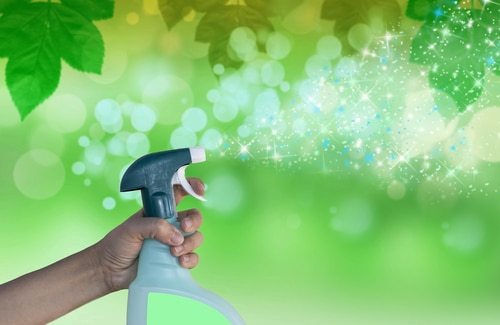
01 Dec Which Green Cleaning Products Are The Best?
When discussing our house, kitchen, and bathroom cleaning services, I often ask which green cleaning products are the best. Which ones get the job done, and which ones aren’t worth the cute flowery packaging they come in? As a consumer, you can’t simply rely on the pretty label and creative marketing packaging; you gotta know what to look for! With the overwhelming amount of choices, it’s hard to decide which products will give you the most bang for your buck and which products fall short when it comes to their promises of cleaning green!
When we started our business in 2007 as pioneers in the all-natural/organic housekeeping business, our choice of green goods was limited. Not the case today; with the sea of products on store shelves, it’s not easy to navigate through the natural cleaning aisle, let alone know which ones work and which are true to their natural/organic promise. And since cleaning products aren’t food, beverages, or drugs meant to be ingested, you aren’t going to get any government help. There is no mandate or regulatory committee for ingredients, so it’s up to the consumer to do their homework. That can be as cumbersome as many as deep cleaning the grout in their master shower!
With all these choices, it may be no surprise that last year alone, the U.S. cleaning product industry led the world in sales taking in an estimated 25 billion dollars. No wonder domestic goddesses Martha Stewart and Jessica Alba are cashing in. Meyers, Method, and the 7th generation have long-held top spots in the natural cleaning biz, but some new players are hitting the scene, and some old players are getting knocked off their soapboxes.
If you don’t know what “greenwashed” is – you should. It could not only save you big bucks on cleaning products, but it could save your health too! The term green-washing refers to an illegal practice in which companies claim to be more environmentally friendly than they are. The practice can make it extremely challenging for consumers to make smart choices.
Who’s helping narrow the playing field? Watchdog groups like the Environmental Working Group, or EWG, aim to educate consumers about agricultural subsidies, toxic chemicals, and drinking water pollutants. They are doing the homework for you. These groups prevent you from “greenwashing” by weeding out the fake stuff and shady marketing. The bottom line is that they have your back and know their stuff!
EWG’s healthy living home guide is a home run and a sort of one-stop shop for consumers. Empowering people to live healthier lives in a healthier environment, the rate, and give out eco grades for popular name “green” cleaning products (ewg.org).?
EWG has many categories. Are they giving grades on everything from all-purpose cleaners to disinfectants and laundry detergent?
For example, out of the popular all-purpose brands claiming to clean green, more scored poorly than did well. 90 products tested scored an A, 70 B, 88 C, 262 D, and a whopping 147 failed.?
It’s no surprise Clorox, Fabuloso and Lysol all received a big fat F, but those who also came in with a near-fail score may surprise you! Eco-touting brands like WholeFoods 365 Everyday Value, Babyganics, Betterlife, Caldrea, Charlie’s Soap, Greenworks, 7th Generation, Method, and Mrs. Meyers, to name a few, all received an F for their all-purpose cleaning products. Even companies whose names scream natural cleaning, like Grab Green, Naturally Clean, and The Good Home, received a D and F from the EWG in the all-purpose category.?
Companies that came out on top of almost all products offered by a company called Aspen Clean. Not only did their all-purpose cleaner receive an A rating, but so did their all-in-one concentrate, glass cleaner, and super scrub powder (aspenclean.com). Aunt Fannies, Common Good, Lion Bear, and Ology also received A’s in nearly all their product categories. Not to put too much shame on their company, just because they received an F in one category doesn’t mean all their products failed. Whole Foods’ orange and lemon verbena all-purpose cleaner may not have done well, but their all-purpose pine and lemon zest, unscented glass cleaner, and MISSION surface cleaning wipes in minty fresh all got an A. Check out the EWG list for more information and ratings, and see what products you love to make the grade.?
So what companies are worth watching? Cleaning companies are offering refillable bottles and those using strictly vegan and cruelty-free products. When it comes to consumer choice, less is certainly more these days. Products you make at home or those that are certified Green are safe choices.?
Branch Basics (branchbasics.com) and coconut-based CleanCult (cultclean.com) are newer companies gaining popularity with their convenient refillable bottles. Meliora’s lemon, lavender, and clove laundry powder (Meliora.com), also with reusable containers, are flying off the shelves. And with the help of their engineering and environmental degrees, owners are mixing up some pretty far-out concoctions. It’s this kind of honest eco-friendly branding that is drawing a bigger crowd.?
After 13 years of being in the natural cleaning business, most clients I’ve met, if not all, boast about how their homes smell after our housekeepers have left. Often, their reaction to the essential oils we were burning or the ones we use in our cleaning products was more memorable than the cleaning itself. Fragrance-free is always a safe choice, but not all scents are bad. Some scents are good for you. You need to know what to look for and where to stay clear.?
In today’s busy market, it’s not enough to buy brands with clever marketing tactics; it may not be true just because they say they are green. Check the label, and make sure the product has a Green Seal or Ecologo and is free of triclosan and quaternary ammonium compounds.
That leaves a lot of SOAP boxes to climb on.
